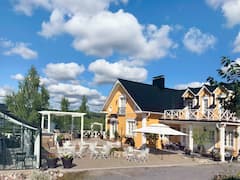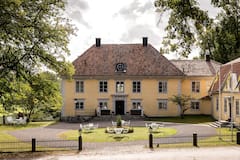For a travel enthusiast, discovering a new destination is a momentous joy. There is nothing quite like consciously traveling to lesser-known and uncrowded locations. If this is how you explore the world, you’re unknowingly advocating sustainable travel, which means adopting better ways to reduce the environmental impacts and maximize the positive effects of tourism. It is a welcome direction that most European travelers are now trying to channel into. From a 2018 study by the European Parliament, 70 of the 105 worldwide destinations experiencing overtourism were in Europe. But the traditional tourism patterns shifted during the pandemic.
A new report from Airbnb shows how bookings in Europe are now diverting away from the busiest tourist hotspots and peak travel dates. Keep reading to discover how Airbnb’s tools and recent updates have helped boost the growing support for sustainable travel trends in Europe.
How the new Airbnb tools are dispersing travel

The pandemic offered new challenges to the travel industry, and Airbnb all the more felt the urge to innovate. It launched the I’m flexible feature in May 2021 and the Categories tool exactly a year after. These flexible search tools are Airbnb’s tech-driven solutions to address mass tourism by paving the way for people to search for exciting but uncrowded destinations and off-peak dates.
Airbnb’s latest report highlights the first analysis of these flexible search tools’ impact on dispersing travel in Europe. It reveals that the trend in bookings shifted from top destinations to less popular locations, with changes visible across destination cities and neighborhood destinations within cities. Preliminary insights and points include:
As compared to guests arranging bookings through the traditional search on Airbnb’s platform, guests who use flexible search tools are likely to book less often in the 20 most sought-after destinations on Airbnb in Europe (-17.5%) and more often in unfrequented communities ranked outside Airbnb’s top 400 destinations (+35.5%).
The flexible search tools provided guests an option to include a location without dates, which enabled them to more likely book a stay outside the top 10% most popular dates (-7.3%) and book nights on weekdays (+5.7%).
The analysis also showcased the help that flexible search tools have introduced in redirecting guests roughly 5 miles (8 kilometers) farther away from their initial intended destination within cities. Data from the flexible search users in the cities of Amsterdam, Barcelona, Lisbon, London, Prague, and Rome support the claim. It shows that the users’ booking decisions demonstrate a consistent shift that leans towards the outskirts of the cities or in other rural areas and off the most popular neighborhoods:
In Amsterdam, flexible bookers commonly stay outside the city center (+32.5%) compared to traditional bookers.
In Barcelona, flexible bookers are less possible to book in the two most popular areas of Eixample and Ciutat Vella than traditional bookers (respectively, -7.1% and -13.4%).
In Lisbon, flexible bookers are more likely to stay outside downtown versus traditional bookers (+42.6%) and less likely to stay in the tourist-packed districts of Santa Maria Major and Misericordia (respectively, -20.1% and -15.8%).
In London, flexible bookers are more likely to stay outside of the City of London (+29% compared to traditional bookers) and less likely to stay in the famous districts of Westminster and Camden (respectively, -17.8% and -23.9%).
In Prague, flexible bookers are less likely to book in the busy central District 1 area compared to traditional bookers (by -21.4%).
In Rome, flexible bookers are less likely to book in the busy central District 1 area than traditional bookers (by -8.1%).
Driving rural stays through Airbnb Categories
With the resumption of travel globally, each of the tourism industry’s definitive sectors has responded to changes according to new travel preferences. Airbnb, for instance, developed a new design feature called Categories to ensure millions of unique homes get easily discovered by travelers around the world. Meanwhile, the European Union (EU) Hosts’ take on this transition is to offer more stays in a rural setting, which they managed to cover:
Over 650,000 listings in the National Parks Category. EU Hosts offering stays in these areas mostly earned around 1,100 EUR (1,100 USD).
About 92,000 listings in the Farm Stays Category. EU Hosts offering these stays typically earned around 1,100 EUR (1,100 USD).
More than 82,000 listings close to a Vineyard. EU Hosts offering these stays commonly earned about 1,500 EUR (1,500 USD).
You might be interested in these Airbnbs!
Tech-driven solutions for Europe's tourism challenges
Continuing its initiative to offer tech-driven solutions, Airbnb aims to maximize the use of flexible search in addressing the challenges associated with the growth of tourism in Europe and across the world through:
Sharing data: Airbnb City Portal is a custom-built platform that governments can use to access data, information, and enforcement tools on Airbnb. This original and novel tool has already been adopted by more than 300 governments globally, including 174 in Europe.
Collecting tax: Recognizing its role in generating government revenues, Airbnb partnered with governments and tax authorities for the automation and simplification of the payment of tourist taxes in Europe and worldwide. As of August 31, 2022, Airbnb’s tax collaborations have collected and remitted 511 million EUR (573 million USD) of tourist tax revenues in the EU and more than 6 billion USD globally.
Good neighbors: Airbnb announced in October 2022 that it will supply free noise sensors to Hosts in more than 60 countries. These devices are integrated into the platform’s messaging tool and instantly alert Hosts of excessive noise events in their listing. The sensors had a six-month pilot in Prague and helped Hosts resolve all noise occurrences in their listings within 20 minutes of detection.
Flexible search as means to sustainable travel
The early analysis of Airbnb’s flexible search tools shows that the behavior of Airbnb users in Europe is a feat in itself—in terms of sustainable and decentralized travel trends. In 2019, the top 10 most visited cities on Airbnb in the EU attributed 20 percent of all trips in Europe but have only garnered 14 percent of trips comes 2022. This dispersed form of travel has equally become popular in rural stays as such bookings increased by 55 percent when the first three quarters of 2019 and the same period in 2022 are compared.
The travel industry is pressingly dependent on sustainable efforts and practices. And using flexible search is one way to start a lingering impact.
History
Get Trip101 in your inbox
Unsubscribe in one click. See our Privacy Policy for more information on how we use your data























Create an account to bookmark our articles, like local expert tips, receive great stories in your inbox, and follow writers and topics that you love.
Log in with Google ×